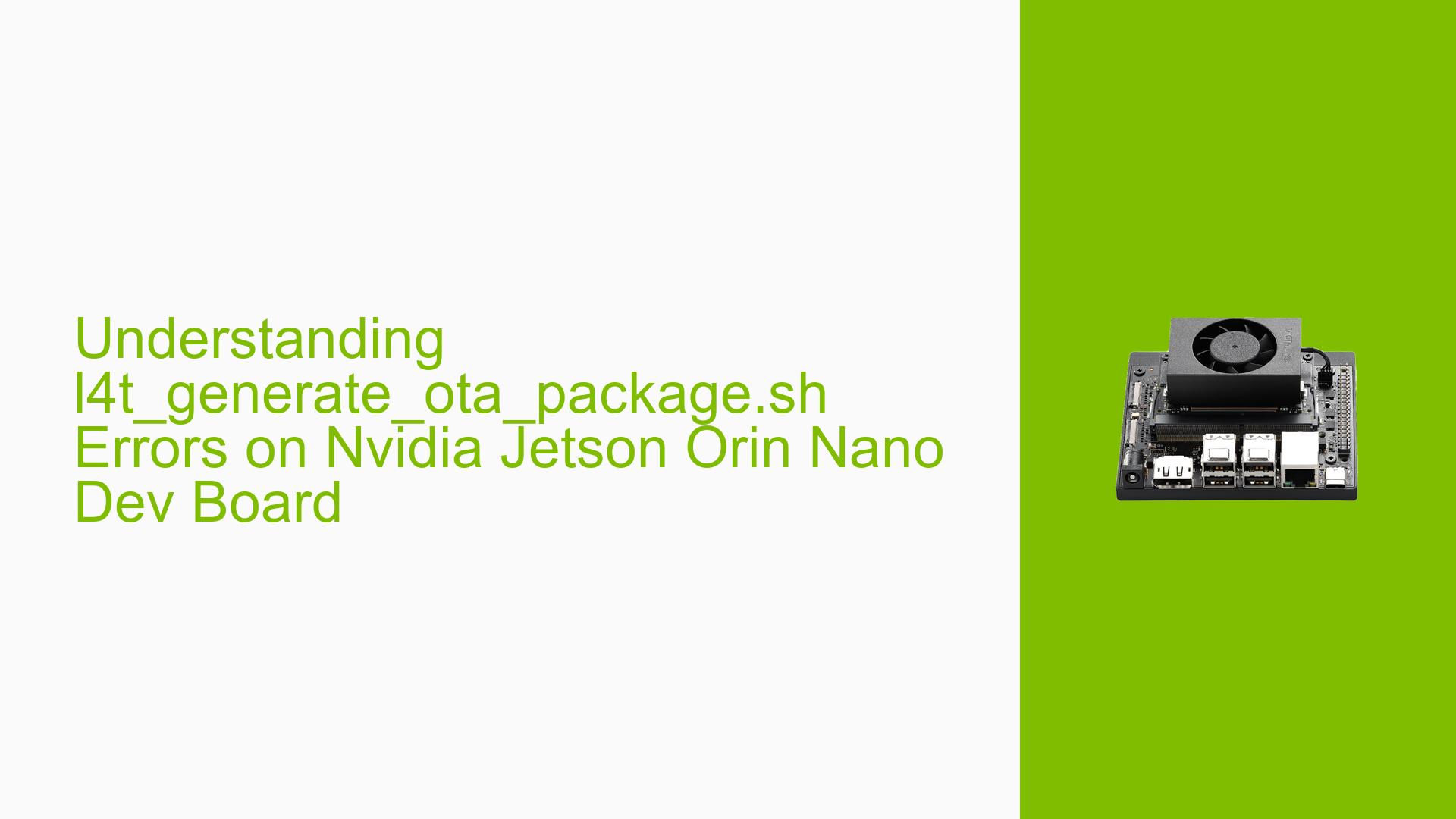Understanding l4t_generate_ota_package.sh Errors on Nvidia Jetson Orin Nano Dev Board
Issue Overview
Users are experiencing issues with the l4t_generate_ota_package.sh script on the Nvidia Jetson Orin Nano Dev board. The primary symptoms include an error message during the generation of an OTA package, specifically:
[ 2.9897 ] End sector for APP, expected at: 122159070, actual: 0
Error: Return value 4
This problem arises after users modify the NUM_SECTORS and ROOTFSSIZE parameters in the partition configuration files. The issue typically occurs during the execution of the script after initial flashing has been completed using l4t_initrd_flash.sh.
Users reported that when they do not make any changes to these parameters, the script runs successfully, but they are left confused about how the script determines the correct sizes for the root filesystem and application partitions.
The hardware specifications include:
- Device: Nvidia Jetson Orin Nano Dev Kit
- Storage: 250GB NVMe SSD
- Desired Root Filesystem Size: 60GB for each APP partition
The problem has been reported consistently among users, significantly impacting their ability to generate OTA packages correctly.
Possible Causes
Several potential causes for this issue have been identified:
-
Incorrect Partition Configuration Files: Users may be using the wrong XML configuration file (e.g.,
flash_l4t_nvme_rootfs_ab.xmlinstead offlash_l4t_t234_nvme_rootfs_ab.xml), which can lead to incorrect sector calculations. -
Modified Parameters: Changes made to
NUM_SECTORSorROOTFSSIZEin configuration files may not be compatible with the expected values in the script, leading to discrepancies during execution. -
Script Limitations: The
l4t_generate_ota_package.shscript may not correctly interpret modified parameters if they are not defined consistently across all relevant configuration files. -
User Misconfiguration: Users may inadvertently misconfigure settings or misunderstand how to apply changes effectively.
Troubleshooting Steps, Solutions & Fixes
To resolve the issues with the l4t_generate_ota_package.sh script, follow these troubleshooting steps:
-
Verify Configuration File Usage:
- Ensure you are using the correct partition configuration file for your board. For T234 series boards, use
flash_l4t_t234_nvme_rootfs_ab.xml.
- Ensure you are using the correct partition configuration file for your board. For T234 series boards, use
-
Check Parameter Settings:
- Confirm that both
NUM_SECTORSandROOTFSSIZEare set correctly in the appropriate XML file. - Example setting for
NUM_SECTORS:<partition> <name>APP</name> <num_sectors>419430400</num_sectors> </partition>
- Confirm that both
-
Run Command with Correct Options:
- Use the following command to generate the OTA package while specifying the root filesystem size:
sudo -E ./tools/ota_tools/version_upgrade/l4t_generate_ota_package.sh --external-device nvme0n1 -S 60GiB jetson-orin-nano-devkit R35-4
- Use the following command to generate the OTA package while specifying the root filesystem size:
-
Avoid Conflicting Modifications:
- If you experience errors after modifying settings, revert to default values and test if the OTA package generates successfully without changes.
-
Consult Documentation and Community Resources:
- Review Nvidia’s official documentation for any updates or changes related to OTA package generation.
- Engage with community forums for shared experiences and solutions.
-
Test Different Configuration Scenarios:
- Experiment by generating OTA packages with various configurations (e.g., different sizes) to identify a working setup.
-
Monitor Logs for Errors:
- Check logs generated during script execution for additional error messages that can provide insight into what might be going wrong.
-
Best Practices for Future Prevention:
- Document successful configurations and maintain backups of working XML files.
- Regularly check for firmware updates or patches that might address known issues with scripts.
By following these steps, users should be able to diagnose and resolve issues related to generating OTA packages on their Nvidia Jetson Orin Nano Dev boards effectively.
